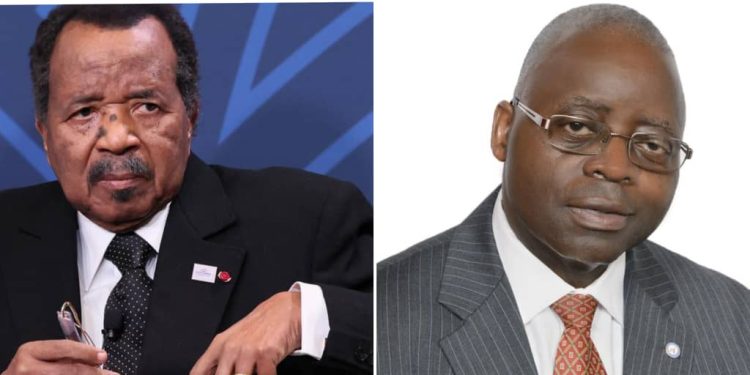Cameroonian constitutional expert, international lawyer, and scholar, Dr Simon Munzu, has suggested that President Paul Biya, who will be 91 this February 13, should voluntarily step down out of a sense of responsibility and love for his country.
In a recent interview with The Post newspaper, Dr Munzu said the president should simply resign at the end of his mandate in October 2025, when the country will be holding a Presidential election.
Despite his advanced age and over four decades in power, President Biya remains the legal presidential candidate of the ruling Cameroon People’s Democratic Movement Party (CPDM) due to his position as Chairman.
This means the President is going to stand for next year’s election unless he decides otherwise.
The Cameroon Constitution also does not place any maximum age restrictions on presidential candidates, despite spelling out the minimum age requirement of 35 years.
This makes Biya legally qualified to seek another seven-year mandate at the Unity Palace during the 2025 election.
However, Dr Munzu said Biya no longer has the physical capability to rule the country, given his advanced age.
Seeking another term, although he is legally permitted to do so, will be a disservice to himself and to Cameroonians.
“President Biya will be only a few weeks short of 93 years old at the time of the next presidential election in October 2025. He ought, as any responsible father, grandfather
or great grandfather, to admit that at this age he no longer has what it takes to govern a country as an executive, as opposed to honorary, Head of State,” said Dr Simon Munzu.
“Even though the law does not compel him to do so, he should, out of a sense of responsibility and out of love for his country and his people, voluntarily step down at the end of his current term in October 2025. If he insists on standing for re-election, it will be up
to the voters to deny him the vote if they no longer want him as their country’s president.”
As the 2025 elections approach, the opposition in Cameroon is mobilizing and devising ways to end Biya’s reign through the ballot box.
Maurice Kamto, who is a prominent opposition leader, is coordinating an opposition coalition called Popular Action for Change (PAC), which aims to create change through joint effort.
But how far would this effort go, remains an uncertain question.
President Biya’s CPDM party has a firm grip of all relevant institutions in the country and has faced accusations of rigging elections in the past to keep the long-serving leader in power.
There have also been fears that a sudden resignation of President Biya might plunge Cameroon into a power tussle, given that there is no defined successor within his ruling party to take his place.
“Indeed, should Mr. Biya suddenly vacate the office of the President of the Republic, the risk of chaos and violence in Cameroon would be high if the succession is not carefully planned and managed,” said Dr Munzu.
He noted that chaos might only arise in the case of Biya’s sudden resignation if the constitution is relegated.
“Our country’s constitution clearly states that, in the event of a vacancy in the office of the President of the Republic, the Speaker of the Senate becomes the interim president for a period between 20 and 120 days. During that time, an election to choose a new president has to be organised. If the Speaker of the Senate is not available, he or she is replaced by the first and subsequent Deputy Speakers by order of seniority.
“The law prohibits the interim president from
being a candidate for that election, altering the composition of the government, modifying the constitution, or organising a referendum. If Mr. Biya vacates the office of the president for any reason and in any manner, all that needs to be done is to strictly apply these rules that have been laid down so clearly by the constitution.
“The risk of chaos and violence would ensue only if some people try to subvert our constitution by acting contrary to its unambiguous stipulations,” said Dr Simon Munzu.
He also explained that fears about President Biya handpicking his son, Franck, as his successor are rife because Cameroonians appear “not to believe in the sanctity of the law”.
Based on Cameroonian law, neither Franck Biya nor any member of the Biya family can legally rule the country in case of any vacancy at the Presidency.



